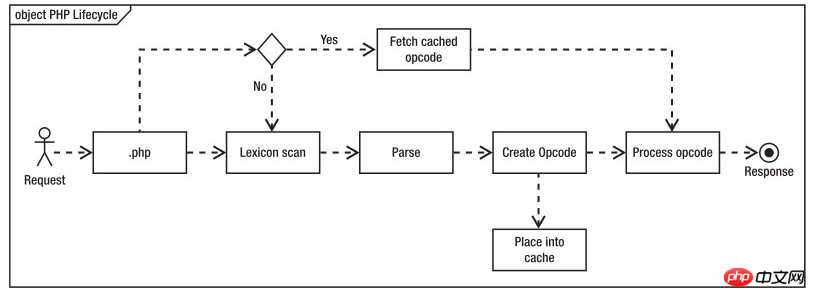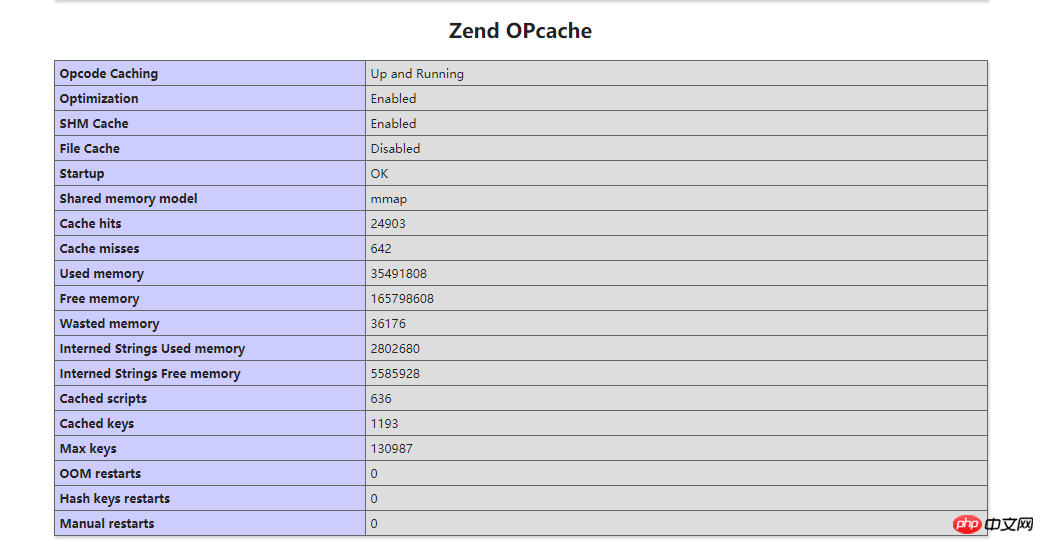 Backend Development
Backend Development
 PHP Tutorial
PHP Tutorial
 How to enable Opcode in PHP7 to create powerful performance Detailed explanation of PHP skills
How to enable Opcode in PHP7 to create powerful performance Detailed explanation of PHP skills
How to enable Opcode in PHP7 to create powerful performance Detailed explanation of PHP skills
This article mainly introduces to you the relevant information on how to enable Opcode in PHP7 to create powerful performance. The article introduces it in great detail through sample code. It has certain reference and learning value for everyone's study or work. Friends who need it can follow Let’s learn together with the editor
Preface
Brother Niao said in his blog that there are several tips to improve the performance of PHP 7, The first is to enable opcache:
Remember to enable Zend Opcache, because PHP7 is faster even without Opcache than PHP-5.6 with Opcache enabled, so during the previous testing period, someone did not enable Opcache.
So what is Opcache?
The predecessor of Opcache is Optimizer, which is a closed-source but free-to-use PHP optimization acceleration component developed by Zend, the official company of PHP. The Optimizer caches the script file Opcode generated by precompiling the PHP code in the shared memory for repeated use in the future, thereby avoiding the time consumption of reading the code from the disk and compiling it again. At the same time, it also applies some code optimization modes to make the code execute faster. Thereby speeding up the execution of PHP.
The normal execution process of PHP is as follows

request request (nginx, apache, cli, etc.) -->Zend engine reads .php file-- >Scan its dictionary and expressions-->Parse the file-->Create computer code to be executed (called Opcode)-->Finally execute the Opcode--> response returns
every time Requesting a PHP script will perform the above steps once. If the PHP source code does not change, then the Opcode will not change. Obviously there is no need to regenerate the Opcode every time. Combined with the ubiquitous caching mechanism in the Web, we can cache the Opcode for future use. Wouldn't it be faster to access cached Opcode directly? The flow chart after enabling Opcode cache is as follows:

The purpose of Opcode cache is to avoid repeated compilation and reduce CPU and memory overhead. .
The following introduces the installation of Opcache
Installation:
1. Find the extension of opcache, mine is php7.1
yum list php71*
2. Install extension
yum install php71w-opcache.x86_64
Configuration:
zend_extension=opcache.so
[opcache]
;Enable opcache
opcache.enable=1;In CLI environment, PHP enables OPcache
opcache.enable_cli=1;OPcache shared memory storage size, unit MB
opcache.memory_consumption=128;PHP uses a technology called string interning to improve performance. For example, if you use the string "foobar" 1000 times in your code, PHP will only allocate an immutable memory area to store the string the first time it is used, and the other 999 times it will be used. Point directly to this memory area. This option will take this feature to the next level - by default this immutable memory area will only exist in a single php-fpm process. If this option is set, it will exist in all php-fpm processes. shared in. In larger applications, this can be very effective in saving memory and improving application performance.
The value of this option is in megabytes. If it is set to 16, it means 16MB. The default is 4MB
opcache.interned_strings_buffer=8;This option is used Used to control the maximum number of PHP files that can be cached in memory. This option must be set large enough to be larger than the sum of all PHP files in your project.
The minimum value of the setting value range is 200, the maximum value is 100000 before PHP 5.5.6, and 1000000 after PHP 5.5.6. That is to say between 200 and 1,000,000.
opcache.max_accelerated_files=4000;Set the cache expiration time (in seconds). If it is 0, it must be checked every time.
opcache.revalidate_freq=60;From Literally means "allowing for faster shutdown". Its role is to provide a faster mechanism to call the destructor in the code at the end of a single request, thereby speeding up PHP's response speed and recycling of PHP process resources, so that the application can respond to the next request more quickly . Set it to 1 to use this mechanism.
opcache.fast_shutdown=1;If enabled (set to 1), OPcache will check the file timestamp (timestamp) in the number of seconds set by opcache.revalidate_freq to check whether the script has been updated.
If this option is disabled (set to 0), opcache.revalidate_freq is ignored and PHP files are never checked. This means that if you modify your code, and then you update it to the server, and then request the function corresponding to the updated code on the browser, you will not see the effect of the update.
It is strongly recommended that you use it in a production environment Set to 0. After updating the code, restart PHP and the web server smoothly.
opcache.validate_timestamps=0;Enable Opcache File Cache (experimental). By enabling this, we can let Opcache cache the opcode cache to an external file. For some scripts, there will be obvious Performance improvement.
In this way, PHP will cache some Opcode binary export files in the /tmp directory, which can exist across the PHP life cycle.
opcache.file_cache=/tmp
View phpinfo :

Test results:

The same interface has been improved from a few hundred milliseconds to about 50ms now

Summary
##Articles you may be interested in:PHP solves the problem of rabbits giving birth to rabbits based on recursive algorithm php tips
Detailed explanation of exception handling in ThinkPHP_php examples
PHP7 PHP skills based on curl-based image upload function
##
The above is the detailed content of How to enable Opcode in PHP7 to create powerful performance Detailed explanation of PHP skills. For more information, please follow other related articles on the PHP Chinese website!

Hot AI Tools

Undresser.AI Undress
AI-powered app for creating realistic nude photos

AI Clothes Remover
Online AI tool for removing clothes from photos.

Undress AI Tool
Undress images for free

Clothoff.io
AI clothes remover

Video Face Swap
Swap faces in any video effortlessly with our completely free AI face swap tool!

Hot Article

Hot Tools

Notepad++7.3.1
Easy-to-use and free code editor

SublimeText3 Chinese version
Chinese version, very easy to use

Zend Studio 13.0.1
Powerful PHP integrated development environment

Dreamweaver CS6
Visual web development tools

SublimeText3 Mac version
God-level code editing software (SublimeText3)

Hot Topics
 1664
1664
 14
14
 1421
1421
 52
52
 1315
1315
 25
25
 1266
1266
 29
29
 1239
1239
 24
24
 Explain JSON Web Tokens (JWT) and their use case in PHP APIs.
Apr 05, 2025 am 12:04 AM
Explain JSON Web Tokens (JWT) and their use case in PHP APIs.
Apr 05, 2025 am 12:04 AM
JWT is an open standard based on JSON, used to securely transmit information between parties, mainly for identity authentication and information exchange. 1. JWT consists of three parts: Header, Payload and Signature. 2. The working principle of JWT includes three steps: generating JWT, verifying JWT and parsing Payload. 3. When using JWT for authentication in PHP, JWT can be generated and verified, and user role and permission information can be included in advanced usage. 4. Common errors include signature verification failure, token expiration, and payload oversized. Debugging skills include using debugging tools and logging. 5. Performance optimization and best practices include using appropriate signature algorithms, setting validity periods reasonably,
 PHP and Python: Comparing Two Popular Programming Languages
Apr 14, 2025 am 12:13 AM
PHP and Python: Comparing Two Popular Programming Languages
Apr 14, 2025 am 12:13 AM
PHP and Python each have their own advantages, and choose according to project requirements. 1.PHP is suitable for web development, especially for rapid development and maintenance of websites. 2. Python is suitable for data science, machine learning and artificial intelligence, with concise syntax and suitable for beginners.
 PHP in Action: Real-World Examples and Applications
Apr 14, 2025 am 12:19 AM
PHP in Action: Real-World Examples and Applications
Apr 14, 2025 am 12:19 AM
PHP is widely used in e-commerce, content management systems and API development. 1) E-commerce: used for shopping cart function and payment processing. 2) Content management system: used for dynamic content generation and user management. 3) API development: used for RESTful API development and API security. Through performance optimization and best practices, the efficiency and maintainability of PHP applications are improved.
 PHP: A Key Language for Web Development
Apr 13, 2025 am 12:08 AM
PHP: A Key Language for Web Development
Apr 13, 2025 am 12:08 AM
PHP is a scripting language widely used on the server side, especially suitable for web development. 1.PHP can embed HTML, process HTTP requests and responses, and supports a variety of databases. 2.PHP is used to generate dynamic web content, process form data, access databases, etc., with strong community support and open source resources. 3. PHP is an interpreted language, and the execution process includes lexical analysis, grammatical analysis, compilation and execution. 4.PHP can be combined with MySQL for advanced applications such as user registration systems. 5. When debugging PHP, you can use functions such as error_reporting() and var_dump(). 6. Optimize PHP code to use caching mechanisms, optimize database queries and use built-in functions. 7
 Explain the match expression (PHP 8 ) and how it differs from switch.
Apr 06, 2025 am 12:03 AM
Explain the match expression (PHP 8 ) and how it differs from switch.
Apr 06, 2025 am 12:03 AM
In PHP8, match expressions are a new control structure that returns different results based on the value of the expression. 1) It is similar to a switch statement, but returns a value instead of an execution statement block. 2) The match expression is strictly compared (===), which improves security. 3) It avoids possible break omissions in switch statements and enhances the simplicity and readability of the code.
 PHP vs. Python: Understanding the Differences
Apr 11, 2025 am 12:15 AM
PHP vs. Python: Understanding the Differences
Apr 11, 2025 am 12:15 AM
PHP and Python each have their own advantages, and the choice should be based on project requirements. 1.PHP is suitable for web development, with simple syntax and high execution efficiency. 2. Python is suitable for data science and machine learning, with concise syntax and rich libraries.
 The Enduring Relevance of PHP: Is It Still Alive?
Apr 14, 2025 am 12:12 AM
The Enduring Relevance of PHP: Is It Still Alive?
Apr 14, 2025 am 12:12 AM
PHP is still dynamic and still occupies an important position in the field of modern programming. 1) PHP's simplicity and powerful community support make it widely used in web development; 2) Its flexibility and stability make it outstanding in handling web forms, database operations and file processing; 3) PHP is constantly evolving and optimizing, suitable for beginners and experienced developers.
 PHP vs. Other Languages: A Comparison
Apr 13, 2025 am 12:19 AM
PHP vs. Other Languages: A Comparison
Apr 13, 2025 am 12:19 AM
PHP is suitable for web development, especially in rapid development and processing dynamic content, but is not good at data science and enterprise-level applications. Compared with Python, PHP has more advantages in web development, but is not as good as Python in the field of data science; compared with Java, PHP performs worse in enterprise-level applications, but is more flexible in web development; compared with JavaScript, PHP is more concise in back-end development, but is not as good as JavaScript in front-end development.



